Funding granted for innovative clean air project to learn how Bristol travel changed during pandemic

Dr Fiona Crawford, Research Fellow in Transport Studies, has been awarded funding for a new innovative clean air project, looking at how car and van travel has changed across Bristol during different stages of the pandemic.
Fiona’s project, ‘Characterising changing travel patterns in the COVID-19 era’, looks at applying methods previously used in gene sequencing, to number plates and vehicle registration data, in order to generate insights into travel behaviour during the pandemic and provide insights into the air quality impacts of changes in working patterns and shopping behaviour (e.g., increasing home working and home deliveries).
The research will use data supplied by Bristol City Council, under a data sharing agreement, and is very timely with the Clean Air Zone due to be introduced in the city in October 2021.
Dr Crawford said: “We are thrilled to receive this funding to help with our research. We know that there have been far fewer cars on the road during the pandemic, but what we don’t know is whether it is the least polluting vehicles that have been taken off the roads.
“This research will examine how travel has changed across Bristol during the pandemic and these behavioural responses will be examined alongside the emissions standard of the vehicles involved.”
The funding is part of the University of Birmingham-led TRANSITION Clean Air Network, funded by UK Research and Innovation. TRANSITION has awarded £48,000 to five innovative clean air research projects, including Fiona’s, aimed at helping to shape the UK’s low-emission mobility revolution to deliver clean air solutions and help meet the government’s ‘net zero’ targets by 2050.
The five projects, led by both commercial and academic organisations, aim to: characterise changing travel patterns; measure exposure to pollution in different transport modes; progress real-time identification of pollution sources; reduce the emissions of pollutants from so-called ‘zero-emission’ vehicles; and minimise public exposure at the roadside.
It comes after the UK government last month (April) announced it has set the world’s most ambitious climate change target into law to reduce emissions by 78% by 2035, compared to 1990 levels.
Dr Suzanne Bartington, TRANSITION Lead Investigator and Public Health Clinician and Environmental Epidemiologist at the University of Birmingham, said: “We are delighted to fund these innovative projects spanning UK road, rail and bus transport. The outputs will advance our knowledge, understanding and tools to reduce health harms of transport emissions.”
Related news

15 December 2025
UWE Bristol rises eleven places in People & Planet University League
UWE Bristol has risen to 14th in the People & Planet University League (UK), a jump of eleven places.

12 December 2025
UWE Bristol’s environmentally conscious and student-focused accommodation wins three awards
Purdown View, the world's largest certified Passivhaus student accommodation development, has been recognised at Property Week Student Accommodation Awards.

20 November 2025
UWE Bristol ranked among top 12 per cent of universities globally for sustainability
UWE Bristol has climbed over 400 places in the QS World University Sustainability Rankings 2026, which evaluates universities on a range of environmental and social impacts.

06 November 2025
UWE Bristol welcomes West of England Mayor for annual Green Week
Helen Godwin, Mayor of the West of England, visited UWE Bristol during its annual Green Week to see the sustainability-driven research, innovation and skills initiatives that are helping to power the growth of the region’s green economy.
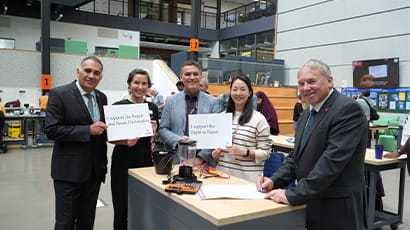
16 October 2025
UWE Bristol signs Repair and Reuse Declaration in commitment to sustainable initiatives
UWE Bristol is the first UK university to sign the Repair and Reuse Declaration as a whole institution, a call to legislators and decision makers to tackle climate change through greater repair and reuse support.

15 October 2025
UK food needs radical transformation on scale not seen since Second World War, new report finds
A new report from the Agri-Food for Net Zero Network+ finds urgent action on food is needed if the UK is to reboot its flagging economy, save the NHS billions, ensure national food security, and meet climate commitments.
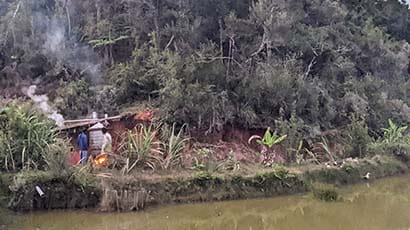
24 September 2025
UWE Bristol to help protect threatened forest in Madagascar in £800k project
UWE Bristol is a partner in a groundbreaking project awarded almost £800,000 in funding to protect one of Madagascar’s most precious and threatened forests.
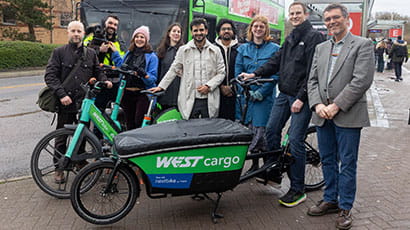
24 February 2025
WESTbusStop+ makes sustainable travel more convenient
A new WESTbusStop+ bringing together buses and other ways to travel has been officially opened at UWE Bristol’s Frenchay campus.
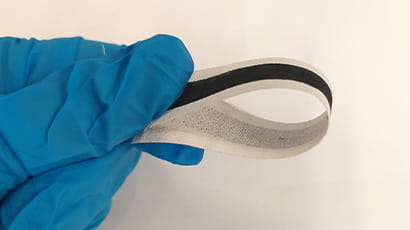
03 January 2025
Big leap forward for environmentally friendly ‘e-textiles’ technology
Research led by UWE Bristol and the University of Southampton has shown wearable electronic textiles (e-textiles) can be both sustainable and biodegradable.
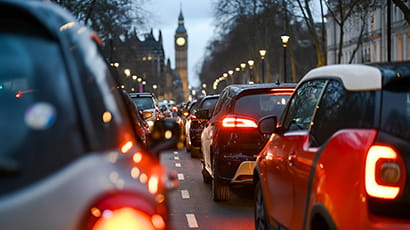
28 November 2024
Work of UWE Bristol academics features in Government report on air quality measurement
Two UWE Bristol academics have made contributions to an influential Government report on the measurement of air pollution.
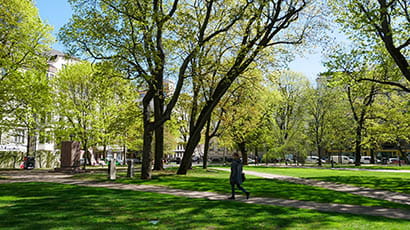
27 November 2024
Traffic noise reduces the stress-relieving benefits of listening to nature, study finds
Road traffic noise reduces the wellbeing benefits associated with spending time listening to nature, researchers have discovered.
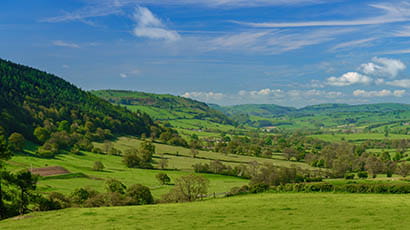
15 November 2024
Grasslands project led by UWE Bristol academic to support UK’s bid for net zero emissions
A UWE Bristol researcher will lead a £4.7 million project focused on the management of UK’s grasslands aimed at supporting efforts to achieve net zero emissions by 2050.






